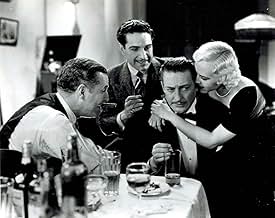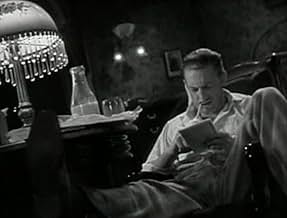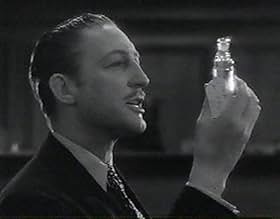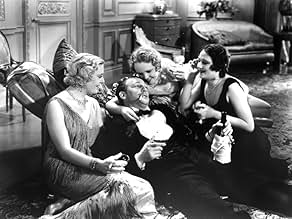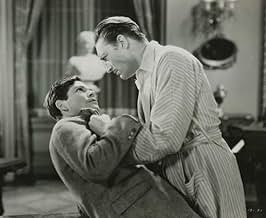Füge eine Handlung in deiner Sprache hinzuProsecutor becomes a defense attorney after an innocent man is sent to an electric chair.Prosecutor becomes a defense attorney after an innocent man is sent to an electric chair.Prosecutor becomes a defense attorney after an innocent man is sent to an electric chair.
J. Carrol Naish
- Tony Rocco
- (as J. Carroll Naish)
Berton Churchill
- Rocco Trial Judge
- (Nicht genannt)
Davison Clark
- Detective Arresting Garland
- (Nicht genannt)
Kenne Duncan
- Office Worker
- (Nicht genannt)
Helena Phillips Evans
- Crying Prospective Client
- (Nicht genannt)
Empfohlene Bewertungen
A disillusioned Assistant DA becomes THE MOUTHPIECE for a scurvy assortment of crooks & criminals. His new public persona is mirrored by his shady, lustful private life. Can the influence of two very different women save him before it's too late?
Warren William drives this very entertaining, albeit forgotten courtroom melodrama. With its rapid-fire plot & smart aleck dialogue, the film is a perfect representation of its era.
William was ideal at this kind of role; indeed, he played several others in the early 1930's which were almost mirror images of Vincent Day, the shyster lawyer he gives life to here. With his patrician bearing & interesting bass voice, William's characters were always worth watching. In this film, his courtroom scenes are especially engrossing as he engages in histrionics & sly subterfuge to sway the juries. It is to Hollywood's discredit that this very fine actor is virtually unknown today.
Aline MacMahon gives another of her splendid performances, here as William's world-weary, tough-as-nails secretary who secretly loves him. Sidney Fox is very good as the innocent Southern girl who's smart enough to recognize William's wicked ways.
Guy Kibbee has the small role of a sympathetic bartender. Movie mavens will spot an uncredited Charles Lane as a hotel clerk.
Warren William drives this very entertaining, albeit forgotten courtroom melodrama. With its rapid-fire plot & smart aleck dialogue, the film is a perfect representation of its era.
William was ideal at this kind of role; indeed, he played several others in the early 1930's which were almost mirror images of Vincent Day, the shyster lawyer he gives life to here. With his patrician bearing & interesting bass voice, William's characters were always worth watching. In this film, his courtroom scenes are especially engrossing as he engages in histrionics & sly subterfuge to sway the juries. It is to Hollywood's discredit that this very fine actor is virtually unknown today.
Aline MacMahon gives another of her splendid performances, here as William's world-weary, tough-as-nails secretary who secretly loves him. Sidney Fox is very good as the innocent Southern girl who's smart enough to recognize William's wicked ways.
Guy Kibbee has the small role of a sympathetic bartender. Movie mavens will spot an uncredited Charles Lane as a hotel clerk.
THE MOUTHPIECE (Warner Brothers, 1932), directed by James Flood and Elliott Nugent, does not pertain to anything regarding to the inventions of a smoking pipe, a telephone handset nor a component of a brass instrument. In fact, the term "mouthpiece" is a slang term for lawyer, a highly regarded role enacted by Warren William. Taken from the play by Frank J. Collins, the story scripted by Joe Jackson, is reportedly based on the life of William J. Fallon, a New York City attorney, but fiction or not, THE MOUTHPIECE is a perfect example of what extremes that any attorney would do to win both case and fame.
The plot opens in a New York City courtroom where Vincent Day (Warren William), an assistant district attorney, through his testimony, convinces the jury to convict Robert Wilson (Emerson Treacy) for "taking the life of an innocent girl." On the very night of Wilson's execution in the electric chair, Day is notified by District Attorney Forbes (Walter Walker) that Wilson innocent with the real culprit caught and arrested. Because he sent an innocent man to his death, Day drowns his sorrows drinking heavily in a bar where he's served by Paddy, an Irish bartender (Guy Kibbee) who convinces him to put his legalistic knowledge to work, and making more money in the process, by becoming a defense lawyer. Day soon accepts his new challenge working as a "mouthpiece" for mobsters. His first case finds him proving Pondapolis (Stanley Fields), a boxer, guilty by catching him off guard with one punch. He later rises to fame after getting Tony Rollo (J. Carroll Naish), an Italian mobster, off for poisoning an administrator. Having opened his own law office, Day acquires a personal secretary in Miss Hickey (Aline MacMahon), and Celia Farraday (Sidney Fox), recently from Riverport, Kentucky, as his stenographer. While Hickey is secretly in love with Day, his sole interest is on Celia. Unlike the other women from his illicit past, Day comes to realize Celia's loyalty to Johnny Morris (William Janney), the boy she intends to marry. Learning how her salary has come from Day's "blood money," Celia quits her job, agreeing to resume her position (at no salary) until Day is able to obtain another secretary to replace her. Some time later, Johnny, working as a bank messenger, is arrested on the charge of a $2,000 bond theft. Believing him innocent, Celia comes to Day for help, even at the possible risk of he endangering himself for going against his gangster friends.
THE MOUTHPIECE is Warren William's showcase from start to finish. A dress rehearsal for his latter attorney role in the short-lived "Perry Mason" film series (1934-36), many rightfully label his role of Vincent Day to be one of William's top screen performances, and naturally so. Aside from his astounding courtroom cases, it's hard to forget his underhanded method by getting Barton (John Wray), a bank cashier, off for embezzling $90,00 from his employer, Mr. Smith (Morgan Wallace) of E.A. Smith & Associates, then "earning" the remaining $10,000 of the bank's own money for himself; and swallowing an entire bottle of poison to prove his case in the courtroom to give the jury a reasonable doubt his client is innocent.
Supported by a capable cast of Warners stock players, including Berton Churchill (The Judge); Murray Kinnel (Thompson, Day's Butler); Mae Madison (Elaine); Ralph Ince (J.B); the mean-looking Jack LaRue (Joe Garland) and Charles Lane (Hotel Desk Clerk), only the pert and dark-haired Sidney Fox makes her loan-out assignment to Warners from her home-base studio of Universal. Fox, an interesting screen personality with a brief movie career (1931-34), is quite believable as the honest but naive Celia Farraday, down to her Southern accent. Also giving a commendable performance is Aline MacMahon playing another loyal secretary no different from her debut screen performance in FIVE STAR FINAL (1931) opposite Edward G. Robinson. Her sincere performance is the sort of role that remains in memory long after the film is over.
Remade twice by Warners, first as THE MAN WHO TALKED TOO MUCH (1940) with George Brent and Virginia Bruce; and as ILLEGAL (1955) with Edward G. Robinson and Nina Foch, the 1932 original, though virtually forgotten until resurrected during the early years of Turner Network Television (1988) followed by occasional broadcasts on Turner Classic Movie, has never been surpassed. In the Hollywood sense, pace is fast, story contrived but interesting, and conclusion quite suspenseful.(***)
The plot opens in a New York City courtroom where Vincent Day (Warren William), an assistant district attorney, through his testimony, convinces the jury to convict Robert Wilson (Emerson Treacy) for "taking the life of an innocent girl." On the very night of Wilson's execution in the electric chair, Day is notified by District Attorney Forbes (Walter Walker) that Wilson innocent with the real culprit caught and arrested. Because he sent an innocent man to his death, Day drowns his sorrows drinking heavily in a bar where he's served by Paddy, an Irish bartender (Guy Kibbee) who convinces him to put his legalistic knowledge to work, and making more money in the process, by becoming a defense lawyer. Day soon accepts his new challenge working as a "mouthpiece" for mobsters. His first case finds him proving Pondapolis (Stanley Fields), a boxer, guilty by catching him off guard with one punch. He later rises to fame after getting Tony Rollo (J. Carroll Naish), an Italian mobster, off for poisoning an administrator. Having opened his own law office, Day acquires a personal secretary in Miss Hickey (Aline MacMahon), and Celia Farraday (Sidney Fox), recently from Riverport, Kentucky, as his stenographer. While Hickey is secretly in love with Day, his sole interest is on Celia. Unlike the other women from his illicit past, Day comes to realize Celia's loyalty to Johnny Morris (William Janney), the boy she intends to marry. Learning how her salary has come from Day's "blood money," Celia quits her job, agreeing to resume her position (at no salary) until Day is able to obtain another secretary to replace her. Some time later, Johnny, working as a bank messenger, is arrested on the charge of a $2,000 bond theft. Believing him innocent, Celia comes to Day for help, even at the possible risk of he endangering himself for going against his gangster friends.
THE MOUTHPIECE is Warren William's showcase from start to finish. A dress rehearsal for his latter attorney role in the short-lived "Perry Mason" film series (1934-36), many rightfully label his role of Vincent Day to be one of William's top screen performances, and naturally so. Aside from his astounding courtroom cases, it's hard to forget his underhanded method by getting Barton (John Wray), a bank cashier, off for embezzling $90,00 from his employer, Mr. Smith (Morgan Wallace) of E.A. Smith & Associates, then "earning" the remaining $10,000 of the bank's own money for himself; and swallowing an entire bottle of poison to prove his case in the courtroom to give the jury a reasonable doubt his client is innocent.
Supported by a capable cast of Warners stock players, including Berton Churchill (The Judge); Murray Kinnel (Thompson, Day's Butler); Mae Madison (Elaine); Ralph Ince (J.B); the mean-looking Jack LaRue (Joe Garland) and Charles Lane (Hotel Desk Clerk), only the pert and dark-haired Sidney Fox makes her loan-out assignment to Warners from her home-base studio of Universal. Fox, an interesting screen personality with a brief movie career (1931-34), is quite believable as the honest but naive Celia Farraday, down to her Southern accent. Also giving a commendable performance is Aline MacMahon playing another loyal secretary no different from her debut screen performance in FIVE STAR FINAL (1931) opposite Edward G. Robinson. Her sincere performance is the sort of role that remains in memory long after the film is over.
Remade twice by Warners, first as THE MAN WHO TALKED TOO MUCH (1940) with George Brent and Virginia Bruce; and as ILLEGAL (1955) with Edward G. Robinson and Nina Foch, the 1932 original, though virtually forgotten until resurrected during the early years of Turner Network Television (1988) followed by occasional broadcasts on Turner Classic Movie, has never been surpassed. In the Hollywood sense, pace is fast, story contrived but interesting, and conclusion quite suspenseful.(***)
ADA Vincent Day (Warren William) successfully prosecutes a man for murder through only circumstantial evidence, and when his innocence is discovered Day tries to contact the prison before the man is executed, only to be too late. He is torn up about this, resigns, and then oddly tries to right his wrong by becoming a criminal defense lawyer and getting acquittals for people who are very guilty. He does this sometimes just through his great talent, but he also does some dishonest and very risky things.
Day also likes the ladies, and he hires naive country mouse Celia Farraday (Sidney Fox) for his office staff planning to seduce her. But when her reaction to his advances is not what he expects he has a rebirth of conscience. This conscience comes in handy when Celia's fiance is arrested and accused of stealing his employer's bonds though he claims that he was robbed, and he doesn't seem to have a consistent believable story at all. Complications ensue.
This was the part that got Warren William noticed. He had been playing the cad for about a year, but his performances, though enchanting, didn't have the depth and empathy of his role in The Mouthpiece. The success of this film caused him to be placed in similar roles in a string of precode movies to the point he was typecast and had a hard time continuing his career at the leading man level once the precode era ended. Sidney Fox, largely a Universal star, really does well here. It may even be the best thing she ever did, in spite of that rather distracting southern accent. With Aline MacMahon as Day's Girl Friday with her usual witticisms and wise girl attitude, this one is well worth watching 90 years later.
Day also likes the ladies, and he hires naive country mouse Celia Farraday (Sidney Fox) for his office staff planning to seduce her. But when her reaction to his advances is not what he expects he has a rebirth of conscience. This conscience comes in handy when Celia's fiance is arrested and accused of stealing his employer's bonds though he claims that he was robbed, and he doesn't seem to have a consistent believable story at all. Complications ensue.
This was the part that got Warren William noticed. He had been playing the cad for about a year, but his performances, though enchanting, didn't have the depth and empathy of his role in The Mouthpiece. The success of this film caused him to be placed in similar roles in a string of precode movies to the point he was typecast and had a hard time continuing his career at the leading man level once the precode era ended. Sidney Fox, largely a Universal star, really does well here. It may even be the best thing she ever did, in spite of that rather distracting southern accent. With Aline MacMahon as Day's Girl Friday with her usual witticisms and wise girl attitude, this one is well worth watching 90 years later.
One of the better movies of 1932, "The Mouthpiece" features a tour de force performance by Warren William as a brilliant but corrupt prosecutor with a weakness for dames, drink and dollars but who is redeemed by a stubborn moral sense that sometimes overcomes his vices. The screenplay, by the prolific but tragically short-lived Joseph Jackson (whose other work includes such gems as "Safe in Hell" and "One Way Passage"), is both hard-edged and witty, with many of the funniest wisecracks delivered memorably by the incomparable Aline MacMahon as William's loyal secretary, the type of role that might have been played by Joan Blondell or Glenda Farrell had the studio casting dice landed another way. The familiar Warners-First National stock company appears in full force including Guy Kibbee as a speakeasy bartender; Noel Francis as a golddigger; J Carrol Naish as a gangster; Walter Walker as a district attorney. The diminutive Sidney Fox persuasively plays a secretary in William's firm who helps to set him on the right path.
I love old movies. And, of these, perhaps the ones I like best are the so- called 'Pre-Code' pictures. This refers to a time period in the early 30s when there was a set of rules and standards for films but Hollywood routinely ignored them. While you might think these older films were sanitized and highly moral back in the day, the Pre-Code period was filled with films that had a lot of very adult content-- even by today's standards. Eventually, the public began avoiding theaters and groups like the Catholic Legion of Decency began demanding changes. Faced with lower revenues and too much bad publicity, the studios finally caved in to demands and created a tougher new code in mid-1934--one which practically banned everything! It's a shame in some ways, because the old Pre-Code films are pretty exciting--and sometimes better than the Post-Code pictures.
A great example of the differences between the styles in these films can be seen in the old Pre-Code movie, "The Mouthpiece". Like many movies of the time, it was remade several times--and these Post-Code versions were rather weak in comparison. All three versions are shown regularly here in the States on Turner Classic Movies and I'm compulsive enough to have seen them all so you don't have to!
"The Mouthpiece" stars Warren William--an actor who was very popular back in the day but who is sadly forgotten today. Some of this is because he died rather young but most is that after the Code was finally enforced, the rakish jerk he played so convincingly in so many films was now forbidden--and the characters he played in the Post-Code films were awfully bland by comparison.
When the film begins, Vince Day(William) is a prosecuting attorney-- and a very successful one. However, his confidence and swagger are knocked out from under him when a man he convicted and got sentenced to death is executed...and it's now known that the man was innocent. Not surprisingly, he quits this job and becomes a defense attorney instead. What is surprising, though, is that he quickly begins to feel right at home with the other side of the law and soon begins defending the scum of the earth. He is no champion of justice or the oppressed! To make it worse, he uses a variety of tricks and theatrics to gain acquittals--even though some of these tricks are clearly the sort of things that could get him disbarred. But, the tricks do work--and jury after jury is swayed by his courtroom antics. And, the gangsters in town love him.
When not working, Vince spends most of his time chasing women. Married or single...it makes no difference to Vince and the film strongly implies that he sleeps around...a lot. Additionally, he frequents speakeasies (this IS during Prohibition) and hangs out with underworld types. All this comes to a head when one of his secretaries, Celia (Sidney Fox) confronts him for his antics when he makes the moves on her. For some odd reason, he actually respects her and cares what she thinks of him. Could he have a conscience after all?! Where all this goes next, you'll just have to see it for yourself but it certainly won't disappoint.
So how does "The Mouthpiece" differ from the remakes? Well, most of the difference is due to the actor playing Vince. You could believe that Warren William is a dirty old lecher and crooked lawyer in "The Mouthpiece". However, in the later remakes, George Brent and Edward G. Robinson play the same guy. Brent is smooth but safe in his characterization and Robinson is much older and seems to have even less libido than Brent! They're tricky but not much more. And, as a result, these excellent actors come off as dull--whereas William NEVER is ever dull! In fact, during much of the film William's character chases after Celia even when she is described as 'jailbait'--a woman who is underage! Additionally, there is a hard cynical edge and originality that make it hard not to be captivated by "The Mouthpiece" and it's simply a much better film. Sure, it's sleazy...but you can't stop watching!
There is a sad epilogue to this film. The diminutive Sidney Fox is terrific in this film, particularly when she confronts Vince for being the blackguard that he really is. However, only a decade later, at age 34, she died--and her death appears to have been a suicide. As for William, his career clearly took a turn for the worse after 1934 and he began appearing more and more in B-movies as opposed to the prestige pictures from earlier in his career. He died from cancer at age 53. Reportedly, however, in real life he had been nothing like the rogue he played so well in the 1930s.
A great example of the differences between the styles in these films can be seen in the old Pre-Code movie, "The Mouthpiece". Like many movies of the time, it was remade several times--and these Post-Code versions were rather weak in comparison. All three versions are shown regularly here in the States on Turner Classic Movies and I'm compulsive enough to have seen them all so you don't have to!
"The Mouthpiece" stars Warren William--an actor who was very popular back in the day but who is sadly forgotten today. Some of this is because he died rather young but most is that after the Code was finally enforced, the rakish jerk he played so convincingly in so many films was now forbidden--and the characters he played in the Post-Code films were awfully bland by comparison.
When the film begins, Vince Day(William) is a prosecuting attorney-- and a very successful one. However, his confidence and swagger are knocked out from under him when a man he convicted and got sentenced to death is executed...and it's now known that the man was innocent. Not surprisingly, he quits this job and becomes a defense attorney instead. What is surprising, though, is that he quickly begins to feel right at home with the other side of the law and soon begins defending the scum of the earth. He is no champion of justice or the oppressed! To make it worse, he uses a variety of tricks and theatrics to gain acquittals--even though some of these tricks are clearly the sort of things that could get him disbarred. But, the tricks do work--and jury after jury is swayed by his courtroom antics. And, the gangsters in town love him.
When not working, Vince spends most of his time chasing women. Married or single...it makes no difference to Vince and the film strongly implies that he sleeps around...a lot. Additionally, he frequents speakeasies (this IS during Prohibition) and hangs out with underworld types. All this comes to a head when one of his secretaries, Celia (Sidney Fox) confronts him for his antics when he makes the moves on her. For some odd reason, he actually respects her and cares what she thinks of him. Could he have a conscience after all?! Where all this goes next, you'll just have to see it for yourself but it certainly won't disappoint.
So how does "The Mouthpiece" differ from the remakes? Well, most of the difference is due to the actor playing Vince. You could believe that Warren William is a dirty old lecher and crooked lawyer in "The Mouthpiece". However, in the later remakes, George Brent and Edward G. Robinson play the same guy. Brent is smooth but safe in his characterization and Robinson is much older and seems to have even less libido than Brent! They're tricky but not much more. And, as a result, these excellent actors come off as dull--whereas William NEVER is ever dull! In fact, during much of the film William's character chases after Celia even when she is described as 'jailbait'--a woman who is underage! Additionally, there is a hard cynical edge and originality that make it hard not to be captivated by "The Mouthpiece" and it's simply a much better film. Sure, it's sleazy...but you can't stop watching!
There is a sad epilogue to this film. The diminutive Sidney Fox is terrific in this film, particularly when she confronts Vince for being the blackguard that he really is. However, only a decade later, at age 34, she died--and her death appears to have been a suicide. As for William, his career clearly took a turn for the worse after 1934 and he began appearing more and more in B-movies as opposed to the prestige pictures from earlier in his career. He died from cancer at age 53. Reportedly, however, in real life he had been nothing like the rogue he played so well in the 1930s.
Wusstest du schon
- WissenswertesThe Vince Day character is very loosely based on Bill "The Great Mouthpiece" Fallon, one of the great criminal defense attorneys of the 1920s, who successfully defended gambler Arnold Rothstein in the "Black Sox" Fix of the 1919 World Series. Nevertheless, Fallon's daughter, Ruth, won a criminal libel judgment in a Syracuse, N.Y. police court, against the owner of a theater that showed the film. It was later overturned.
- PatzerJust as Vince's car drives off after picking up Celia during her last day, a lighting stand can be seen briefly across a doorstep.
- Zitate
Miss Hickey, Day's Secretary: It's all in the days work, said the street sweeper to the elephant.
- VerbindungenReferenced in Black Eye (1974)
Top-Auswahl
Melde dich zum Bewerten an und greife auf die Watchlist für personalisierte Empfehlungen zu.
Details
- Erscheinungsdatum
- Herkunftsland
- Sprache
- Auch bekannt als
- Mannen utan samvete
- Drehorte
- Produktionsfirma
- Weitere beteiligte Unternehmen bei IMDbPro anzeigen
- Laufzeit
- 1 Std. 26 Min.(86 min)
- Farbe
- Sound-Mix
- Seitenverhältnis
- 1.37 : 1
Zu dieser Seite beitragen
Bearbeitung vorschlagen oder fehlenden Inhalt hinzufügen

